One of the most important decisions to make when you’re building a website is what software you’ll use to design it. In this website builder vs WordPress comparison, we’ll explore two of the most popular options for creating a website to help you make the right choice.
First, let’s define these terms:
🏗️ A website builder is a drag-and-drop tool that makes it easy to construct a website without using a single line of code or having other technical experience. Most website builders use visual editors, which means you’ll be able to see exactly what your web pages will look like while designing them.
Many modern website builders also function as SaaS (software as a service) products, where you pay a monthly fee for everything you need to make a website, like hosting, domain names, page builders, and apps. Examples of these website builders include Squarespace or Wix. Having said that, WordPress is sometimes considered a website builder, too, since it…helps you “build a website.”
👨💻 WordPress is a Content Management System (CMS) that helps you create and manage web pages, blog posts, and other content to present on a published website. WordPress lets you choose the type of editor (HTML, WYSIWYG, or visual drag-and-drop editor), so you have great flexibility over the design process.
For instance, a more advanced developer could use a code editor, while others may opt for a no-code (drag-and-drop) editor like Gutenberg or Elementor (both of which are actually website builders within the WordPress CMS). You don’t need to understand code to build a website with WordPress, but it does require more technical know-how than most SaaS website builders.

👉 For this website builder vs WordPress comparison, we’ll focus on two key areas:
- Functionality differences like features, design, and extensions/plugins
- Hosting and pricing differences
The main website builders we’ll discuss are Wix and Squarespace. Most popular website builders have similar features to these two options, and we’ll talk a bit more about those options in the Hosting and Pricing sections of this comparison article.
Let’s get started!
Website builder vs WordPress: functionality differences
In this section, we’ll dive into the features, design elements, and plugins that make website builders and WordPress unique.
Features ⚙️
The first thing to consider in the debate between website builder vs WordPress is what these tools allow your website to do. This is especially important if you want to create something like an ecommerce store or an online school.
Website builders
🚀 Most website builders offer the following built-in tools:
- Visual drag-and-drop editor
- Blogging tools
- SEO (Search Engine Optimization) tools
- Ecommerce features (sometimes limited to certain plans)
Many website builders have also started offering AI functionality for website building and content generation.
WordPress
Rather than offering everything you’ll need in the core software, WordPress works as a highly customizable framework, where you add plugins and themes, as well as custom coding (optional) to get the features you want.
🚀 WordPress core features:
- Gutenberg block editor for designing pages and blog posts
- Customizer for modifying styles
- Content organization and media management system for web pages and blog posts
- User management with permissions
You can get additional functionality through essential plugins that come preinstalled with many WordPress hosting plans:
- Yoast SEO for automated SEO
- Jetpack for improved security, site speed, site monitoring, and plugin management
- WooCommerce for ecommerce functionality
Plus, as we’ll discuss in more detail, there are thousands of plugins you can use to add even more features to WordPress.
Design tools 🔧
Now, let’s look into how SaaS website builders differ from WordPress in their design options.
Website builders
Most website builders offer a variety of pre-designed templates – often organized by industry and functionality.
Wix, for example, has over 800 templates organized into categories like Business & Services and Ecommerce. Specific industry templates include Sports and Fitness, Hotels, and Real Estate.
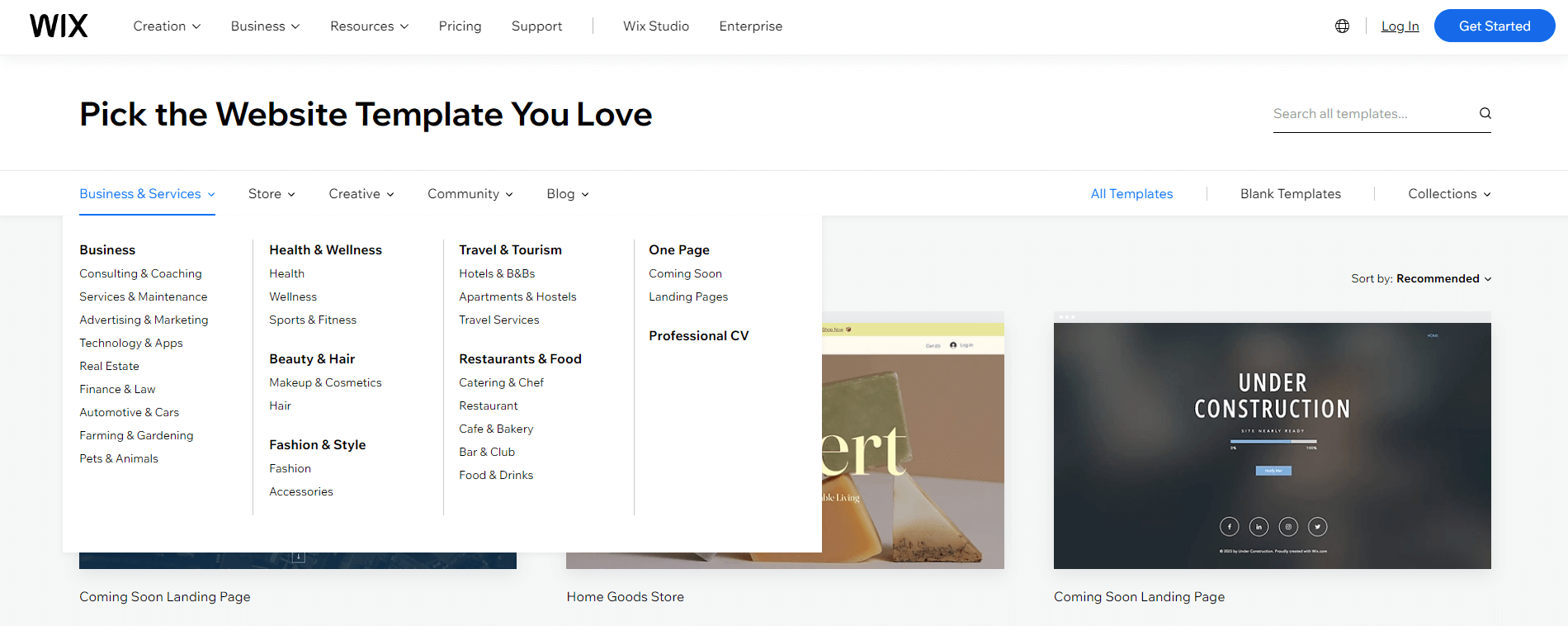
Most website builders have dozens or even hundreds of options to choose from. Some, like the Hostinger website builder, also let you generate a custom template using AI.
Once you’ve chosen a template, you can use the website builder’s editor to customize it. Options vary based on the website builder and the template you’re using, but there are some things you’ll be able to edit with any decent website builder:
- Colors
- Fonts
- Menu content
- Header and footer content
There is also a possibility to edit preset page content. Simply click on an element of your site to see editing options. For instance, you can upload images, edit banners, and type in text.
Here’s an example of what the Squarespace editor looks like:

When you’re finished editing the homepage you can then edit any other page on the website.
All in all, website builder design tools are easy enough for beginners to make something professional, while offering some coding features for advanced users.
WordPress
WordPress uses themes, which are essentially specialized website templates. The big difference is that there are thousands, not hundreds, of WordPress themes available for free through the official WordPress theme repository.
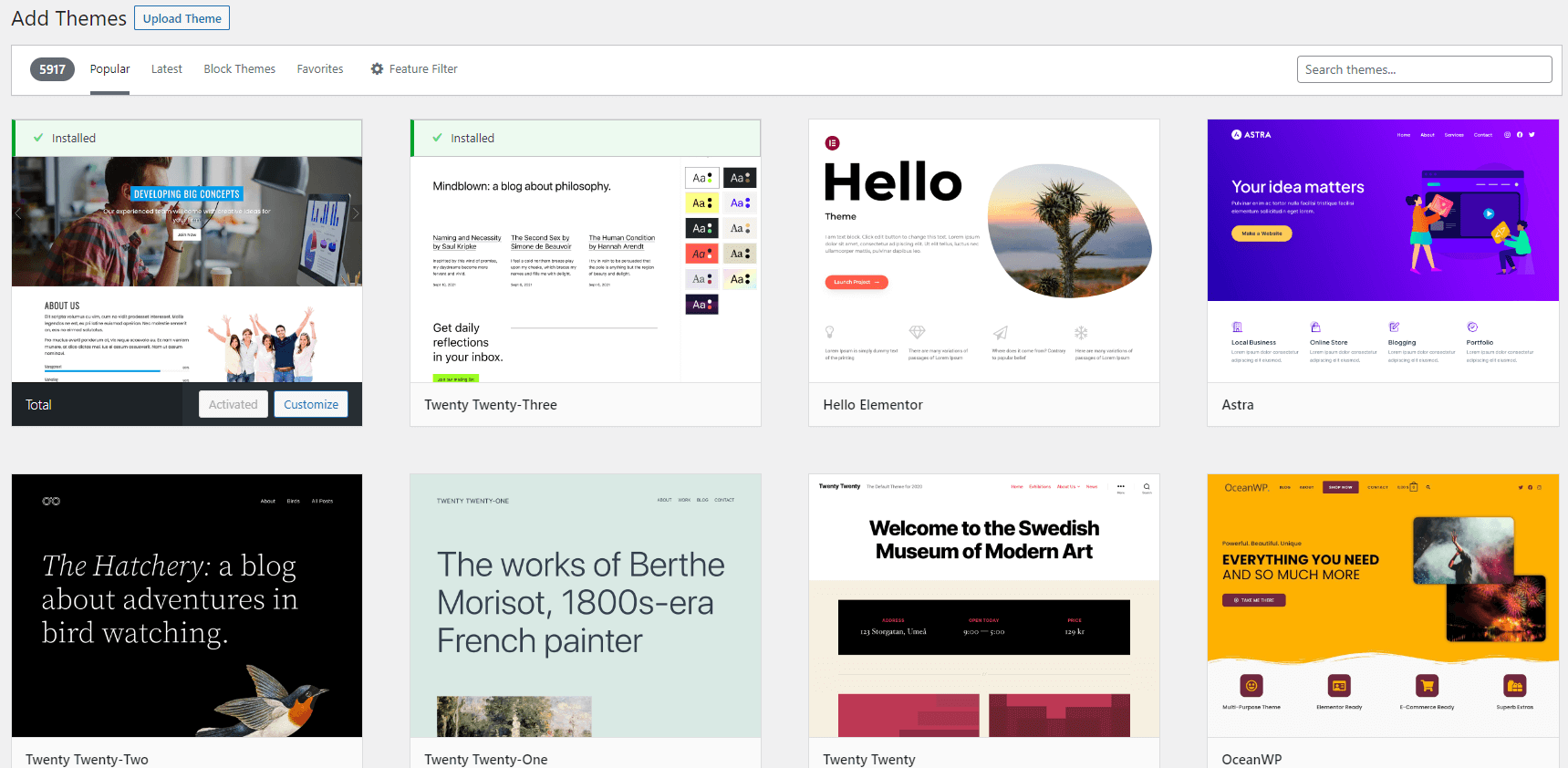
There are also paid themes available, as well as “freemium” themes that have both a free and a premium version. For example, our own highly-rated Neve theme falls under the freemium category.
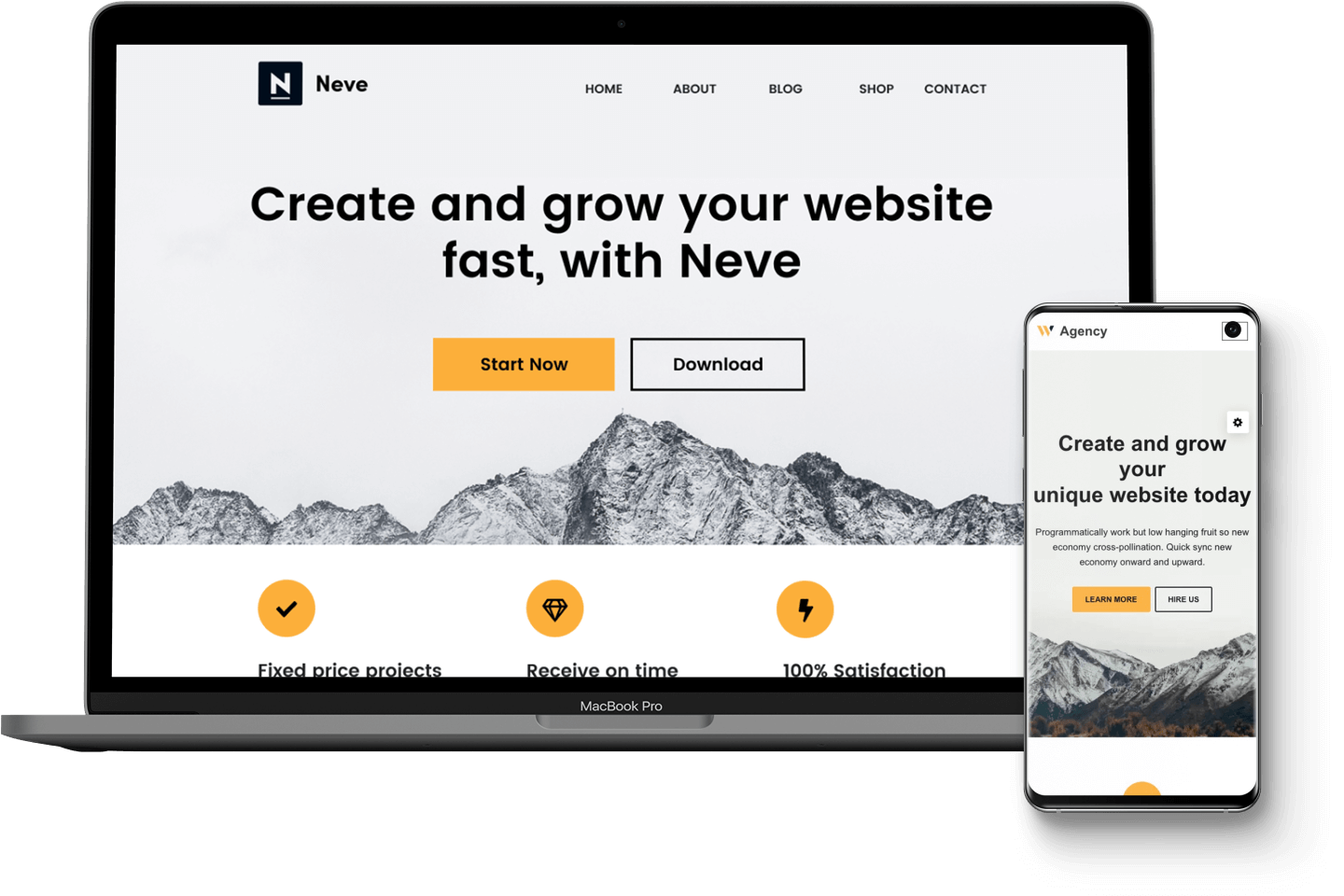
Once you’ve chosen a theme, you can edit the appearance of your site using the WordPress Customizer.
🧩 Editable elements:
- Site colors
- Fonts
- Which page appears as your website homepage
- Header and footer settings
- Menus
Many themes also offer additional customization options, such as sidebar location and widgets or WooCommerce store appearance.
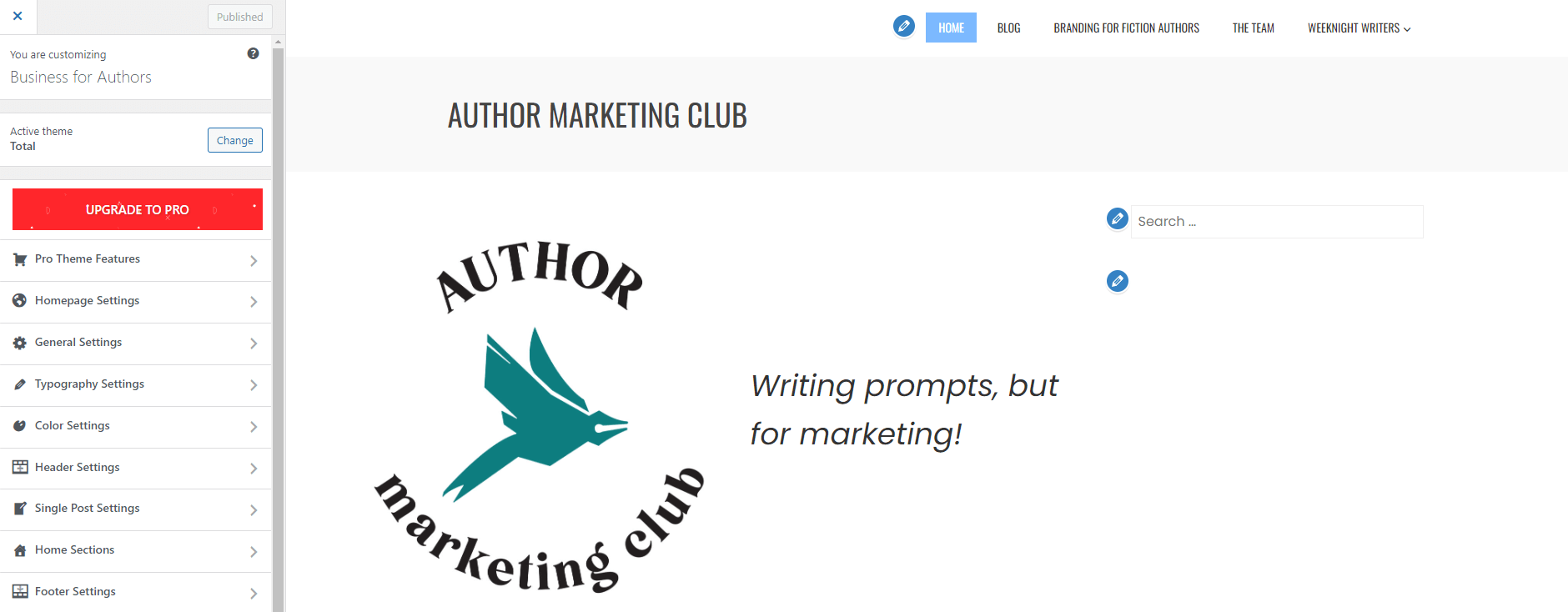
Depending on your theme, you may find the options of the Customizer overwhelming at first, but it’s easy to use once you’re familiar with it. You can also opt to work with a simple theme to limit the number of choices.
For full control of individual pages, you’ll head to the Pages area of your admin panel and open the page you want to work on in the Gutenberg editor. When you’re in the Gutenberg editor, it’s fairly easy to use – just type a title into the top area, press Enter, and start inserting your content.

The Gutenberg editor offers “blocks” – modules that contain specific types of content – for things like pull-quotes, images, videos, tables, and buttons. You can add these blocks by clicking the + button next to any empty space, then selecting the block you want. The blocks can be moved at any time with drag-and-drop technology or by pressing the arrows that appear when a block is highlighted. This makes it easy to reorganize your page.
Customization options for blocks appear above the blocks and in the sidebar. These options are somewhat limited, but they do allow you to modify your page’s appearance in small ways.
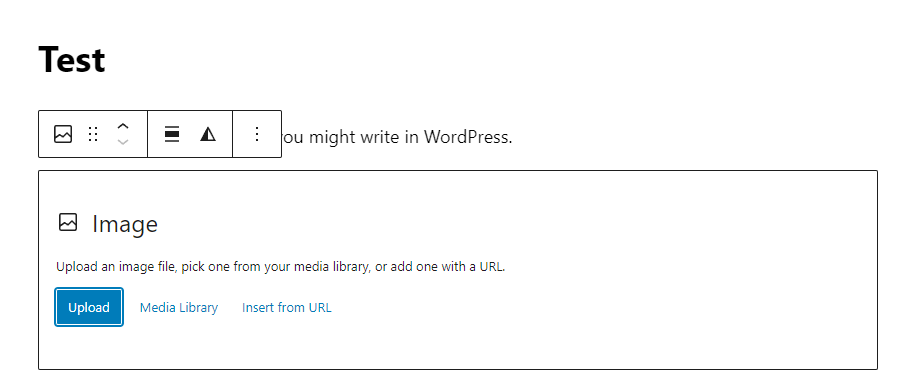
Overall, the WordPress design process gives you a significant number of options for customizing your site and building pages. The process is slightly more complicated than it is with most website builders because of multiple design areas (the WordPress Customizer and Gutenberg).
Add-ons and integrations 🤝
Perhaps the most glaring difference between a standard website builder and WordPress is how they work with add-ons.
Website builders
This is one place where it’s hard to generalize website builders. Every website builder has its own unique library of add-ons and integrations. The top website builders also have far more options than newer or less popular solutions.
🚧 Still, there are some types of add-ons/integrations offered by most website builders:
- Email marketing – Proprietary email marketing tools or integrations with email marketing services like MailChimp.
- Social media integrations – Sharing and follow buttons to encourage readers to interact with you on social media platforms. Some website builders also offer extensions for publishing posts and/or creating ads on these platforms.
- Marketing and advertising – Integrations or add-ons for things like collecting reviews and testimonials, and advertising with Google AdSense.
- Appointment booking – These tools can help you run a service-based business online.
- Accounting and order management – Integrations or add-ons that help you run an ecommerce business more smoothly by doing things like managing orders and inventory, tracking payments, and calculating taxes.
- Event calendars and sales tools – Add-ons or integrations designed to help you run both free and paid events.
Most website builders list their add-ons and integrations publicly. For example, you can check out the Wix App Market or the Squarespace Integrations and Extensions list. This is helpful if you want your website builder to integrate with a specific tool you’re already using, such as QuickBooks.
WordPress
The website builder vs WordPress comparison becomes almost unfair when you start talking about add-ons. There are almost 60,000 free plugins in the official WordPress plugin repository, plus thousands of premium plugins, to help with site management:
There are also page builder plugins, which give WordPress a more visual design interface.
Website builder vs WordPress: which offers the best functionality?
So, when comparing a website builder vs WordPress, which one wins for its features, plugins, and design capabilities?
- Core features: Website builders come out slightly ahead in this category because you typically don’t need to install anything extra for things like SEO optimization, ecommerce, or social media. WordPress is a barebones platform with limited built-in features, but you may get some pre-installed plugins with a specialized hosting account.
- Design: Website builders win for ease of use, but WordPress dominates in terms of customization and flexibility, and it’s all thanks to the thousands of WordPress themes, powerful design features, and the ability to use both drag-and-drop page builders and code.
- Add-ons and integrations: WordPress is the clear winner here thanks to the nearly 60,000 free plugins that allow you to do virtually anything. You can also access premium plugins for even more options.
Website builder vs WordPress: hosting and pricing options
Hosting and pricing is perhaps one of the areas that may sway your opinion on website builders and WordPress. Some people enjoy the simplicity of monthly pricing and built-in hosting from website builders, while others prefer the greater control over pricing and hosting with WordPress.
Website builders
Most website builders function as proprietary online software. To use a specific website builder, you’ll need to pay a monthly fee to get all of its features, including hosting.
📌 Here’s a list of pricing from a few popular website builders:
- Wix – Plans start at $16.00 per month, with ecommerce plans starting at $27.00 per month.
- Squarespace – Plans start at $16.00 per month, with ecommerce plans starting at $23.00 per month.
- Shopify – Plans start at $29.00 per month – all of which support ecommerce functionality.
WordPress
WordPress is open source and free, but there are additional tasks required (like finding your own hosting) and costs associated (like for development, maintenance, and premium themes and plugins).
📌 Here’s a quick list of WordPress hosting options (with pricing):
- Bluehost – Plans start between $2.75 and $2.95 per month (renewal rates start at $9.99 per month). It offers managed WordPress hosting and themes.
- SiteGround – Starting at $2.99 per month ($17.99 per month upon renewal). You can opt for managed WordPress hosting.
- Hostinger – Plans start at $1.99 per month ($3.99 upon renewal). It has several WordPress features.
Website builder vs WordPress: what offers the best hosting and pricing options?
Website builders are great if you’re happy to stick with one company for the lifetime of your website. For us, however, WordPress is the clear winner here as you can shop around for the best price and switch hosting companies at any time.
Website builder vs WordPress: the verdict 🏆
Both website builders and WordPress are excellent tools for creating a website. In the end, your choice should be based on your needs:
- 💁 Choose a website builder if you want the simplest possible website building process from one company.
- 💁 Pick WordPress if you require maximum flexibility in how you build your website and where you host it.
What wins the website builder vs WordPress debate for you? Let us know in the comments below!